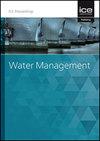制定7个区域含水层地下水污染物修复策略
IF 0.9
4区 工程技术
Q3 ENGINEERING, CIVIL
Proceedings of the Institution of Civil Engineers-Water Management
Pub Date : 2022-07-12
DOI:10.1680/jwama.21.00032
引用次数: 0
摘要
欧洲许多城市面临的共同挑战是土壤和水污染对自然资源的危害。尽管几十年来进行了广泛的调查和补救措施,并采取了目前的环境管理做法,但污染物的残留物仍然存在于土壤和地下水中,降低了许多城市地区的功能。在复杂的水文地质系统中,污染羽流重叠和(或)存在扩散污染,必须彻底规划和长期执行技术和行政活动,以确保地下水质量的恢复。社区需要一个管理战略(MS)来管理城市地区的土壤和地下水污染,特别是在污染超过地方规模但未达到国家水平的地方。MS促使管理部门了解水文地质系统属性,定义新的、可达到的目标值,并为实施必要措施提供实际指导。系统管理的实施促进了关键利益相关者的早期参与,以及他们对系统管理本身发展的贡献。该战略已证明是一种适当和灵活的工具,可以将科学知识转移到大规模地下水污染补救所必需的规划、协调和执行工作中。本文章由计算机程序翻译,如有差异,请以英文原文为准。
Developing groundwater contaminant remediation strategies for seven regional aquifers
A common challenge in many cities in Europe is endangerment of natural resources due to soil and water pollution. Despite extensive investigation and remediation measures over decades and current practices of environmental management, residues of pollutants persist in soil and groundwater, reducing the functionality of many urban areas. In complex hydrogeological systems, where contaminated plumes are overlapping and/or diffuse contamination is present, technical and administrative activities have to be thoroughly planned and executed in the long term to secure the recovery of groundwater quality. Communities need a management strategy (MS) to manage soil and groundwater contamination in urban areas, especially where contamination exceeds local scales but does not reach the national level. A MS drives administrations to understand hydrogeological system properties, define new, reachable target values and give practical guidance for the implementation of necessary measures. Implementation of a MS fosters the early involvement of key stakeholders and their contribution to the development of MS itself. The strategy has proven to be an appropriate and flexible tool for the transfer of scientific knowledge to the planning, coordination and implementation necessary for the remediation of large-scale groundwater contamination.
求助全文
通过发布文献求助,成功后即可免费获取论文全文。
去求助
来源期刊
CiteScore
2.10
自引率
0.00%
发文量
28
审稿时长
6-12 weeks
期刊介绍:
Water Management publishes papers on all aspects of water treatment, water supply, river, wetland and catchment management, inland waterways and urban regeneration.
Topics covered: applied fluid dynamics and water (including supply, treatment and sewerage) and river engineering; together with the increasingly important fields of wetland and catchment management, groundwater and contaminated land, waterfront development and urban regeneration. The scope also covers hydroinformatics tools, risk and uncertainty methods, as well as environmental, social and economic issues relating to sustainable development.

 求助内容:
求助内容: 应助结果提醒方式:
应助结果提醒方式:


